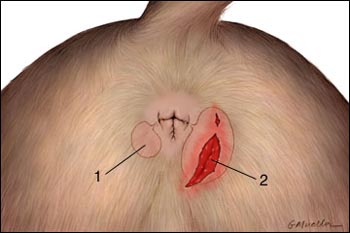Regarding [#Pet Name], here is some information about Anal Sac (Anal Gland) Disease.
Description:
Anal Glands are located on each side of the anus at approximately eight and four o’clock. The sacs are located under the skin, produce a rank smelling glandular secretion and empty through a small duct opening at the margin of the anus.
Anal Sac Disease occurs in three stages:
- Anal Sac Impaction – The anal sac is unable to empty normally through the anal gland duct.
- Anal Sac Inflammation – The affected anal gland becomes painful and inflamed.
- Anal Sac Abscess – Bacterial contamination of the affected anal gland results in an abscess. This may rupture through the skin.
Causes:
Several factors may be causative:
- Obesity – Fat dogs are unable to effectively apply pressure to the anal sacs by scooting. They are also less likely to be able to relieve the pressure by licking because their girth prevents them from reaching the affected area.
- Genetic factors – Certain small breeds of dogs are more commonly affected. The consistency or thickness of the fluid produced in the gland is a contributing factor that may be genetically determined.
- Dietary factors – There is speculation that deficiency of Vitamin A can contribute because Vitamin A has a positive effect on the integrity of glandular duct linings. High fiber foods may also be helpful, especially in obese pets.
Symptoms:
- Scooting across the floor (drag racing).
- Licking the area around the anus.
- Biting or chasing the tail.
- Red or painful under the tail.
- Foul smelling persistent odor.
Diagnosis:
Diagnosis and determining the stage of Anal Gland Disease is made clinically by rectal examination.
Resistant infections may be cultured to determine appropriate antibiotic treatment.
Treatment:
- In the early (impaction) stage, an outpatient procedure called anal gland expression is performed to relieve the impacted anal gland.
- If there is inflammation (anal sacculitis), anal gland expression and infusion of antibiotics into the anal gland is performed. Oral antibiotics may also be used depending on severity.
- If an abscess has occurred, the treatment involves drainage and cleaning out of the affected gland and surrounding tissues. Expression, infusion and systemic antibiotics are used in addition to the procedure.
- Severe, uncontrolled, or recurring anal gland problems may require permanent surgical removal of the anal glands.
Other Information:
Periodic anal gland expression can prevent reoccurrences. Bring your pet in for a recheck if discomfort or scooting resumes.
We recommend rechecking the anal glands one month after initial treatment. Subsequent evaluations will be at longer and longer intervals provided there are no reoccurrences or setbacks.


